Course Overview
Pre School ( Play School to Sr.KG )
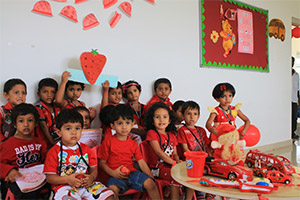 Our curriculum has been designed especially for Preschoolers, using the expertise of qualified early childhood professionals who have vast experience in the field of preschool education. It fosters a higher level of thinking through exploration and guided play. Our curriculum is based not on just one principle. It has been guided by the best of various schools of thought on early childhood education. As a result we have developed a child-friendly curriculum taking the best from the various models listed below:
Our curriculum has been designed especially for Preschoolers, using the expertise of qualified early childhood professionals who have vast experience in the field of preschool education. It fosters a higher level of thinking through exploration and guided play. Our curriculum is based not on just one principle. It has been guided by the best of various schools of thought on early childhood education. As a result we have developed a child-friendly curriculum taking the best from the various models listed below:
- Montessori method
- Multiple Intelligences method
- Play way method
- Project method
In a Montessori program, creating an environment for learning is one of the most important tasks for the teacher. Our curriculum will be based on ‘Theory of Multiple Intelligences’.
At Sanguine, learning material is designed to accommodate the individual learning needs of children, and compare with the best teaching tools available worldwide.
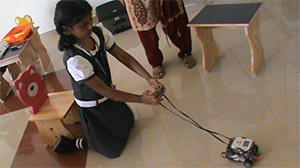
Learning Zones
At Sanguine, we have created various learning zones -creative e-zone, block zone, nature zone, cycle zone, book zone,theater zone, discovery zone, wet zone. Each of these zones have been created to facilitate active and experiential learning.
Technology enabled Space
At Sanguine, the entire school campus is connected with Wired and wireless network. We have also created Internet and mobile interface for parents-teacher interaction. these challenges successfully involves problem solving. Growing with Mathematics is a program designed to teach, children in Kindergarten level, problem solving approach to learning mathematics.
It is a method that involves exploration and discovery rather than practice and drilling. Students won’t be following the teachers’ directions and explanations blindly and then practice until they get it right. Rather, it involves students working with teachers and peers inventing and understanding mathematics. Mathematics which was once a bugbear for many is, at Sanguine Preschool, now a subject with an inclusive and interactive element which a preschooler will look forward to each day. Language learning and mathematic program are fine examples of that.
The Theory of Multiple Intelligences transforms the way our schools are run. Teachers be trained to present their lessons in a wide variety of ways using music, cooperative learning, art activities, role play, multimedia, field trips, inner reflection, and much more. The Theory of Multiple Intelligences does away with the old dull way of dull teacher-centric classes, and boring worksheets and textbooks. The challenge is to get this information out to many more teachers, school administrators, and others who work with children, so that each of our children have the opportunity to learn in ways harmonious with their unique minds.
Primary School ( Grade1 to Grade 5 )
SanguineSchool strives to develop global citizens who make a difference to the world. Sanguine students who complete the Schooling which establishs a personal set of values, inherit the completeness of nature, and lay the foundation upon which international-mindedness develop and flourish. The attributes of such a learner are listed in the learner profile. The attributes of the learner profile are appropriate to, and achievable by, all primary year students.
We strive our students to be:
- Inquirers
- Knowledgeable
- Thinkers
- Communicators
- Principles
- Reflective
- Open-Minded
- Balanced
- Caring
- Risk-Taker
Standards 1 to 5
Our Primary School introduces children to the excitement and challenges of independent learning. We try to involve and stimulate all the nine intelligences. So each concept is taught using audio-visual aids as well as story telling and enacting, to make it more exciting. In understanding ideas, asking questions and working out answers, children improve skills like reading, writing, researching, reasoning and communicating. In the process, they develop both strong academic skills and lasting self-confidence. Arts and Physical Education, including swimming, become a part of their curriculum. In keeping with our philosophy of developing a “complete child”, emphasis is placed on imbibing attributes like respect, tolerance, integrity and personal accountability.
Language
Children of this age have a great interest in the structure of language and need to express themselves through creative writing. Independent and group reading, comprehension exercises, creative composition and research writing, spelling, grammar, punctuation and handwriting are daily activities. In addition to English, Hindi and Kannada are also taught.
Mathematics
The desire to learn more about numbers and numerical realtionships motivates the child to develop computation skills as well as an understanding of money, time, measurement, geometry and algebra. Further study of the combinations and special laws of the decimal system leads to exploration of other base systems. Students then progress to more abstract problem solving.
Geography
Beginning with simple identification of landforms, bodies of water, continents, countries and capitals, students progress to map reading and discussion of geopolitical concepts.
History
Research projects, timelines and discussions bring to life prehistoric eras, the evolution of early people and achievements of different cultures. The goal is an understanding of the relationships between history and contemporary society.
School & community service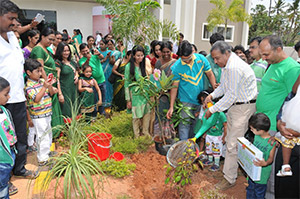
Sanguine believes in the importance of responsibility for oneself, one’s neighbours and the environment. Sanguine is committed to the importance of self-respect and acknowledging our responsibilities to one another. Children take part in the upkeep of the environment, sweeping, dusting and learning how to take care of plants and animals. Periodic Field Trips are organized, connected to project/class work. A variety of enrichment classes (e.g. cooking, special talks by resource persons/guest speakers) are conducted.
Sciences
Starting with the classifications of plant and animal life, children move on to the more complex concepts of structure, function and interrelationships of living organisms. Studies of plants and animals and physical sciences are integrated with the study of the solar system and the earth’s place within it. Simple experiments demonstrate electricity, magnetism, gravity, light and other principles of physics and chemistry.
Visual/Performing arts
Drawing and painting are an essential part of classroom work for all children. Often words and writing go hand-in-hand with drawing. Music and dramatics are also a vital part of the programme.
Physical education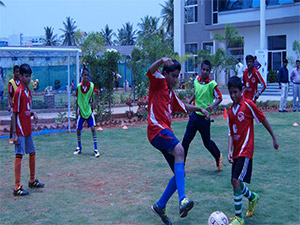
Physical Education begins in the primary years. Motor co-ordination, body awareness and control, physical fitness and team participation are stressed.
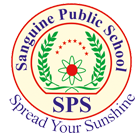
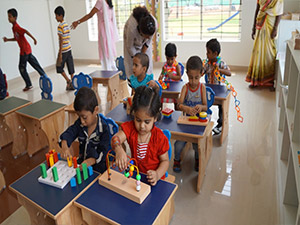 While most kids love to go outside and play there are times when the weather or other factors prohibit outdoor activity. Being cooped up inside needn’t mean no play or activity though. We have plenty of things that children can do to stay active, even when they are stuck indoors. Indoor play is not only great fun for kids but also provide huge health benefits with youngsters climbing, cycling, jumping, and pulling their way around the exciting play equipment. They see it as play but they are in fact gaining ‘Exercise in Disguise’. The benefits of play in a child’s development both physically, socially and emotionally have been widely proved but unlike other activities, children don’t even realize the benefit to their health. Exercise in disguise is the phrase coined to describe this effect all age groups have daily access to the indoor play areas equipped with ride-on, bikes, cars, tunnels, climbing trees, ball pools, etc. Within this area children are encouraged to freely experiment with the toys and participate in light exercise; this is an ideal opportunity to build a child’s confidence in movement.
While most kids love to go outside and play there are times when the weather or other factors prohibit outdoor activity. Being cooped up inside needn’t mean no play or activity though. We have plenty of things that children can do to stay active, even when they are stuck indoors. Indoor play is not only great fun for kids but also provide huge health benefits with youngsters climbing, cycling, jumping, and pulling their way around the exciting play equipment. They see it as play but they are in fact gaining ‘Exercise in Disguise’. The benefits of play in a child’s development both physically, socially and emotionally have been widely proved but unlike other activities, children don’t even realize the benefit to their health. Exercise in disguise is the phrase coined to describe this effect all age groups have daily access to the indoor play areas equipped with ride-on, bikes, cars, tunnels, climbing trees, ball pools, etc. Within this area children are encouraged to freely experiment with the toys and participate in light exercise; this is an ideal opportunity to build a child’s confidence in movement. Recent studies have shown that 30% children of urban affluent families in India are obese. Fast food consumption, watching TV and playing screen-based games were the main causes for their sedentary lifestyle. Only 11% of the children had outdoor games as a major recreation activity. Studies have also shown that as much as 30% of preschoolers of urban affluent families in India are overweight and one in every 9 preschooler is obese.
Recent studies have shown that 30% children of urban affluent families in India are obese. Fast food consumption, watching TV and playing screen-based games were the main causes for their sedentary lifestyle. Only 11% of the children had outdoor games as a major recreation activity. Studies have also shown that as much as 30% of preschoolers of urban affluent families in India are overweight and one in every 9 preschooler is obese.